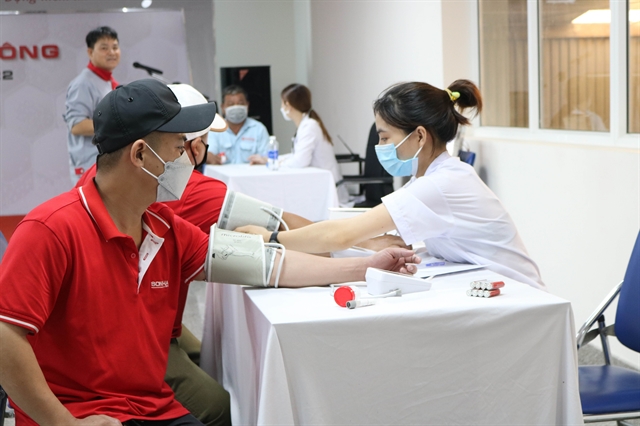 Society
Society


|
| A man has his blood pressure checked at a hospital in HCM City. VNA/VNS Photo |
HCM CITY — HCM City plans to provide free annual health checks to its populace as part of efforts to reduce people’s medical costs and improve their quality of life.
According to a proposal its Department of Health has submitted to the People’s Committee, all residents will get regular health checks at least once a year by 2025 with priority given to people aged 60 and above.
The check-ups for the seniors could be done at medical facilities, their residential localities or at home, and the records electronically documented and managed for life, the proposal said.
The city has about four million people aged 60 and above, most of whom have high blood pressure, diabetes and cardiovascular diseases, according to the department.
Dr Nguyễn Văn Vĩnh Châu, deputy director of the department, said everyone should have equal access to quality healthcare, and good public healthcare plays a prime role in this.
“The goal is to strengthen screening for disease-causing factors and risks, and promote preventive measures for early detection and treatment management to improve the chances of effective treatment.”
Dr Kiều Xuân Thy, deputy head of the HCM City University of Medicine and Pharmacy, said most people did not pay enough attention to periodic check-ups, leading to severe consequences that affect their quality of life.
Regular checks would identify early signs of health issues and improve the chances of effective intervention, she said. There are many factors such as age, health, family history, and lifestyle choices that determine how often people need check-ups.
Medical experts recommend that healthy people aged 25 and older should be screened at least once a year and twice a year if they have certain chronic conditions.
Prof Đỗ Văn Dũng, dean of the School of Public Health at the HCM City University of Medicine and Pharmacy, pointed out that periodic health checks for the entire public would require enormous resources.
He said people should maintain a healthy lifestyle such as exercising regularly, having a healthy diet, and regularly monitoring for symptoms of illnesses for prompt treatment.
Non-communicable diseases
According to the latest statistics published by the World Health Organization, globally noncommunicable diseases (NCDs) kill 41 million people each year or equivalent to 74 per cent of all deaths.
Of them, 77 per cent are in low- and middle-income countries, including Việt Nam.
Cardiovascular diseases account for most NCD deaths annually at 17.9 million, followed by cancers (9.3 million), chronic respiratory diseases (4.1 million), and diabetes (2 million including kidney disease deaths caused by diabetes).
Modifiable behaviours such as tobacco use, physical inactivity, unhealthy diet, and the use of alcohol all increase the risk of NCDs, according to WHO.
Detection, screening and treatment, as well as palliative care, are key components of the response to NCDs.
“To reduce the impact of NCDs on individuals and society, a comprehensive approach is needed requiring all sectors, including health, finance, transport, education, agriculture, planning, and others, to collaborate to reduce the risks associated with NCDs, and to promote interventions to prevent and control them,” WHO recommended. — VNS




